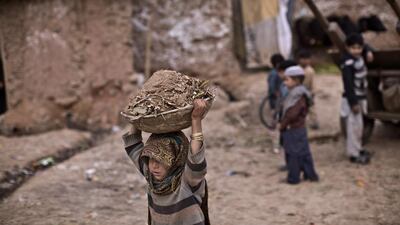At a recent seminar in the National Defence University in Islamabad, the issue of the Afghan refugee situation came up for discussion. It was a most interesting event since it brought to light how far apart the view from Kabul was. And I say Kabul deliberately because, unlike most capital cities, Kabul does not reflect the views of most Afghans.
The majority of speakers seemed aware of the fact that Pakistan was not treating the Afghan refugees well. They pointed out that at the first hint of a terrorist threat, the provincial security forces invariably round up Afghan refugees indiscriminately, most of whom are extremely poor. Despite that, the unanimous conclusion was that Afghan refugees in Pakistan were there to stay.
Many reasons were cited in support of this opinion, including that most of them were born and raised in Pakistan. However, it is obvious that despite incentives from the Afghan government, economic opportunities and the security situation are better in Pakistan than in Afghanistan.
There are 2.5 million registered Afghan refugees in Pakistan. Estimates of the unregistered ones range from a million to twice as many.
Pakistan is familiar with refugees as it has hosted hordes of them since the country’s inception. Unfortunately, many of them still refer to themselves as refugees.
This conclusion has some corollaries. First, the problem is a joint one for Pakistan and Afghanistan. Second, while conditions must be created to attract them back to their home country, Pakistan has to manage them better and expedite their absorption as citizens. Finally, both countries must seek to reignite international interest in their plight until the issue is settled once and for all.
While the last corollary is simple, the other two have implications worth examining.
All managements generally look at an individual as the final arbiter. He or she makes the final decision and is responsible for it. So how does joint responsibility of two states work out? Perhaps though a joint command structure, if relations are amicable. But when there is distrust and hostility, such an effort is likely to result in one party accusing the other of wrongdoing.
There is little doubt that Pakistani tribal areas have played host to Afghan dissidents. Today, Pakistan claims evidence of the fact that Afghan tribal leaders are paying it back in kind.
With or without supportive evidence, both countries accuse each other of harbouring their terrorists. And both go public immediately.
When it comes to creating conditions to encourage refugees to return home, the onus almost exclusively falls on the Afghan government. Pakistan can do nothing to make that happen. However, Pakistan is solely responsible for improving the management of refugees.
Not being a signatory to the UN agreement on refugees, Pakistan needs to address this issue comprehensively, urgently and diligently, preferably without bureaucratic hurdles.
Refugees, while subject to the law of the land, must also have rights. These rights need to be defined while they remain refugees.
While Pakistan must expedite registration of refugees, this is the one aspect in which the Afghan government could and should play a role – that of encouraging refugees to register themselves. If they fail to come forward, the Pakistan government can hardly seek out individuals or families.
This is an issue for which a deadline must be set. It should carry the threat of punitive action. For instance, refugees should be aware that if they are not registered by, say, July 1 next year, they will be forcibly deported and denied citizenship thereafter.
Improving relations might seem unrelated to the problem of refugees, but it isn’t. It is, in fact, a prerequisite.
Diplomacy is the art of negotiation. While it is useless without some threat of repercussions, it is the end that is paramount, not the means. Considering that mutual public accusations from both sides have failed to achieve anything, other than increasing distrust, perhaps it is time to try “quiet diplomacy”.
Each party should quietly share with the other whatever evidence is available. Quietly, because the media merely serves to increase distrust.
Any operation targeting areas of one party’s concern could either be joint or perhaps be conducted in the presence of observers from the other country. Both need to find new ways to decrease mistrust.
Both countries need to reach out and facilitate each other. If the refugee problem is a daunting issue, regional security is even more compelling.
Sharing 2,250 kilometres of a porous border only increases opportunities to indulge in a blame game. This border must be “managed” by mutual agreement. It is all very well for Afghanistan to continue emphasising that it does not accept the Durand Line as an international border, but then what does Pakistan do?
Perhaps this could be another Line of Control or whatever? Even the Durand Line is fine, but Pakistan needs to find ways to ensure that unauthorised and illegal crossing of it from either side must stop. How that is ensured needs to be found amicably.
Brig Shaukat Qadir is a retired Pakistani infantry officer

